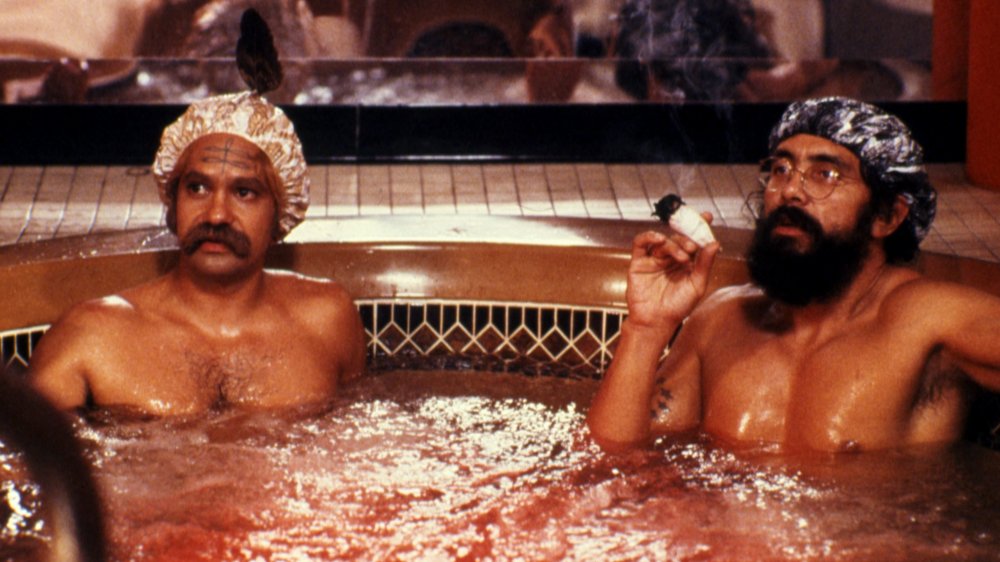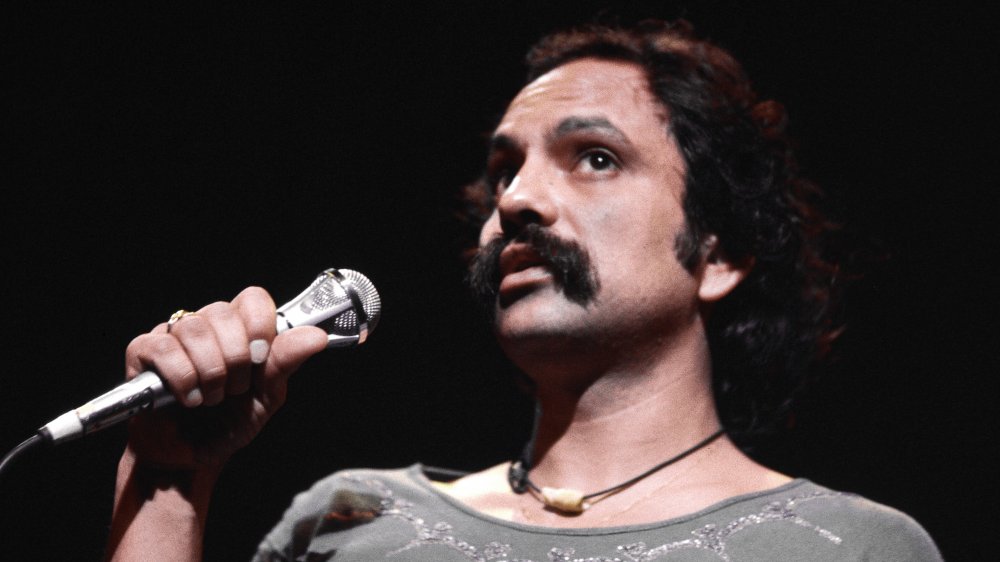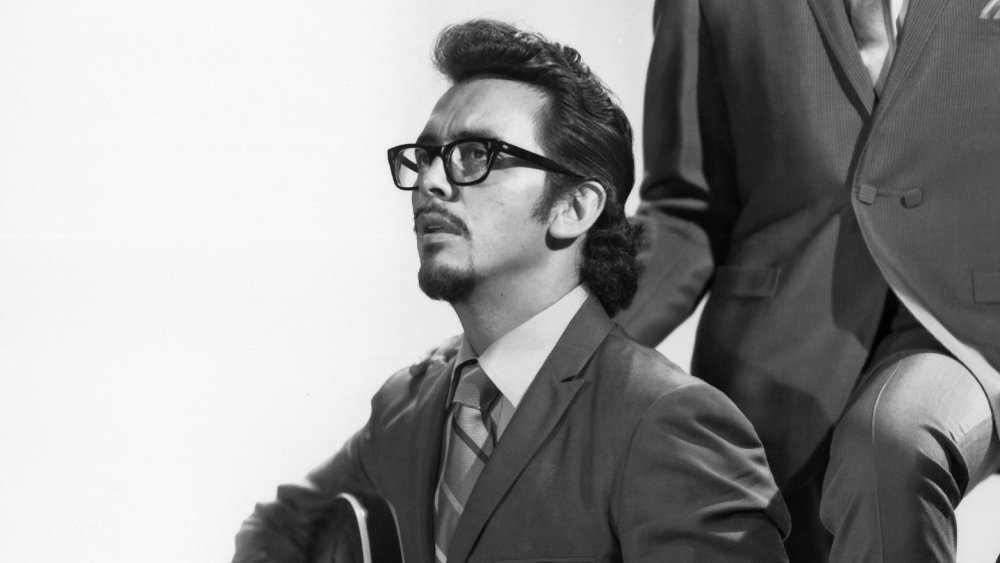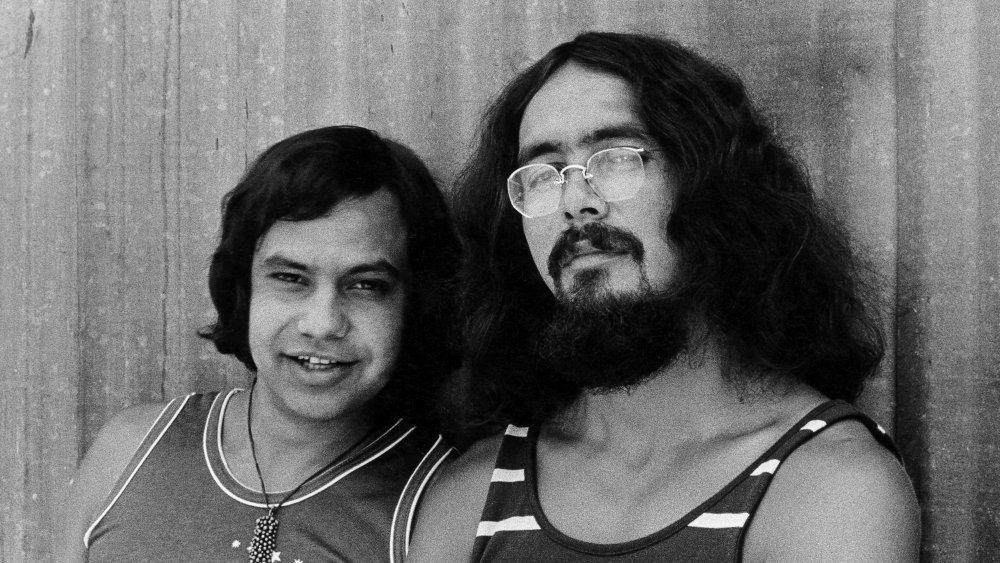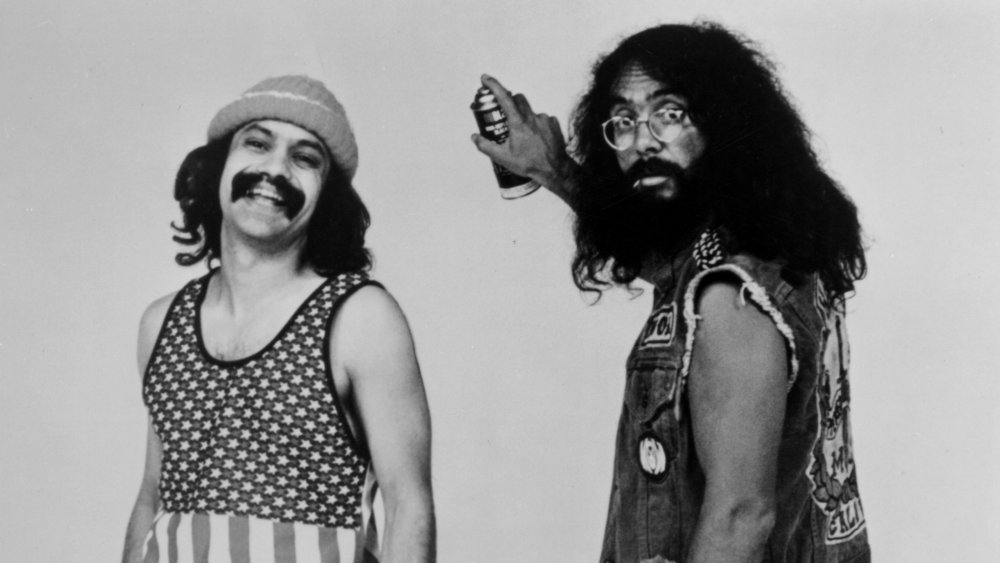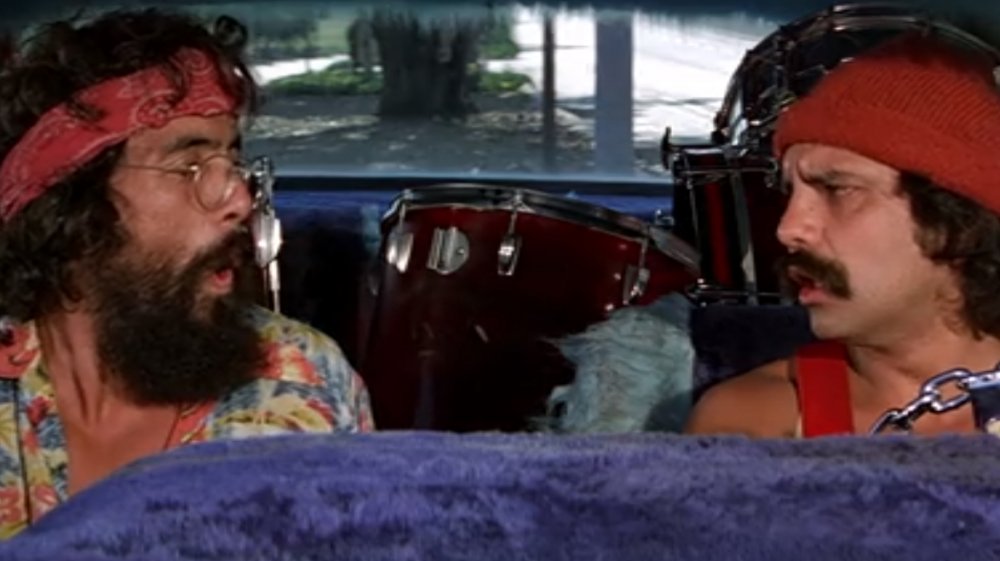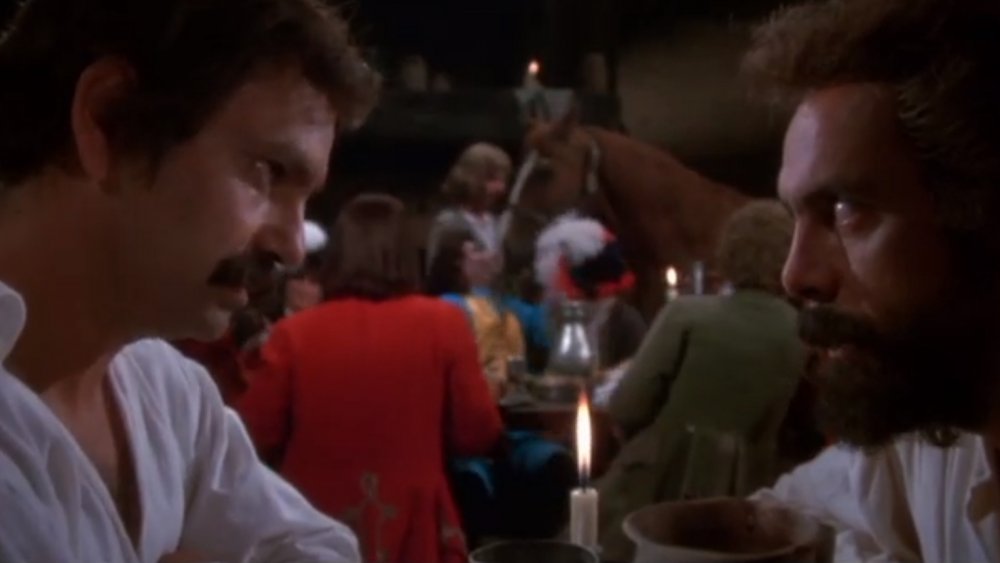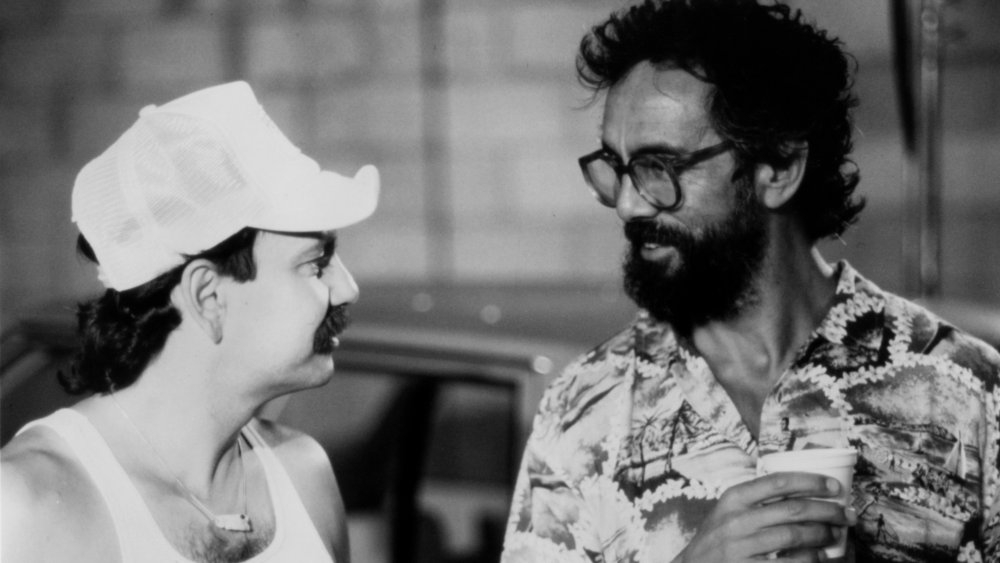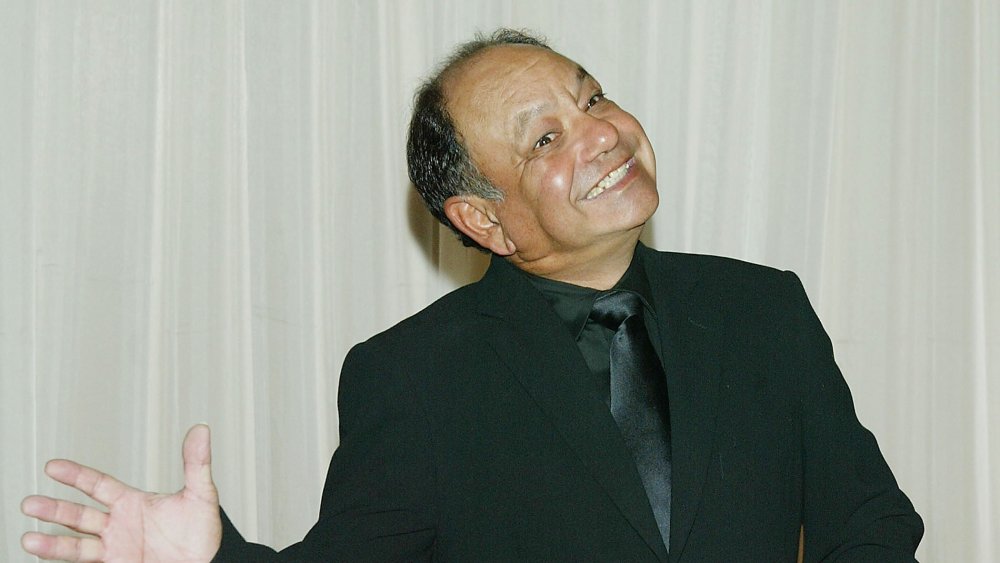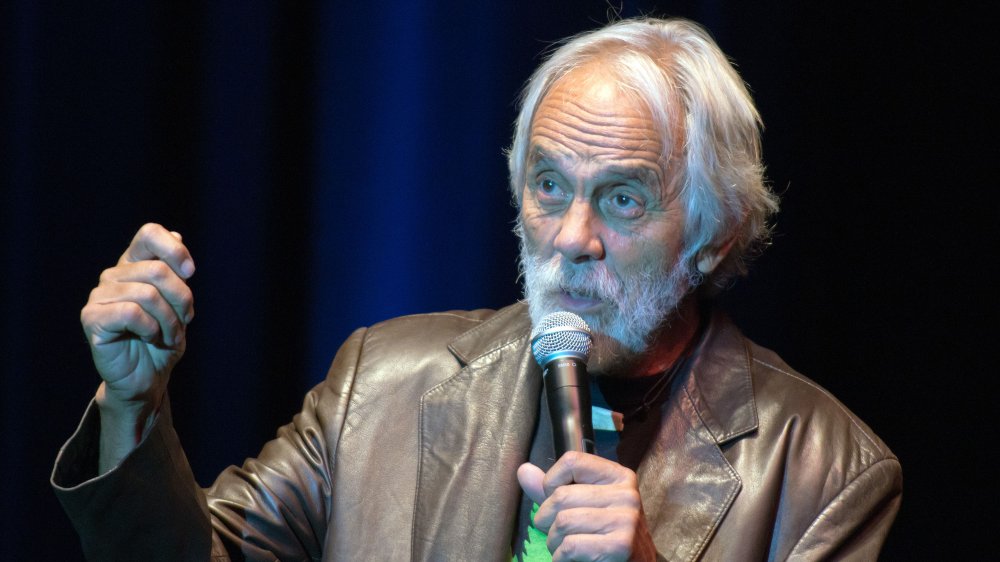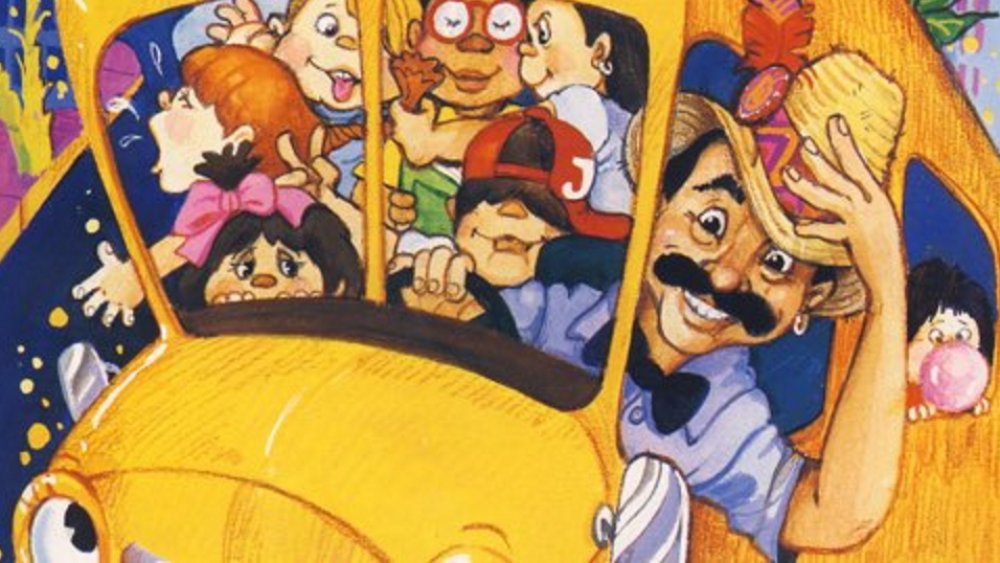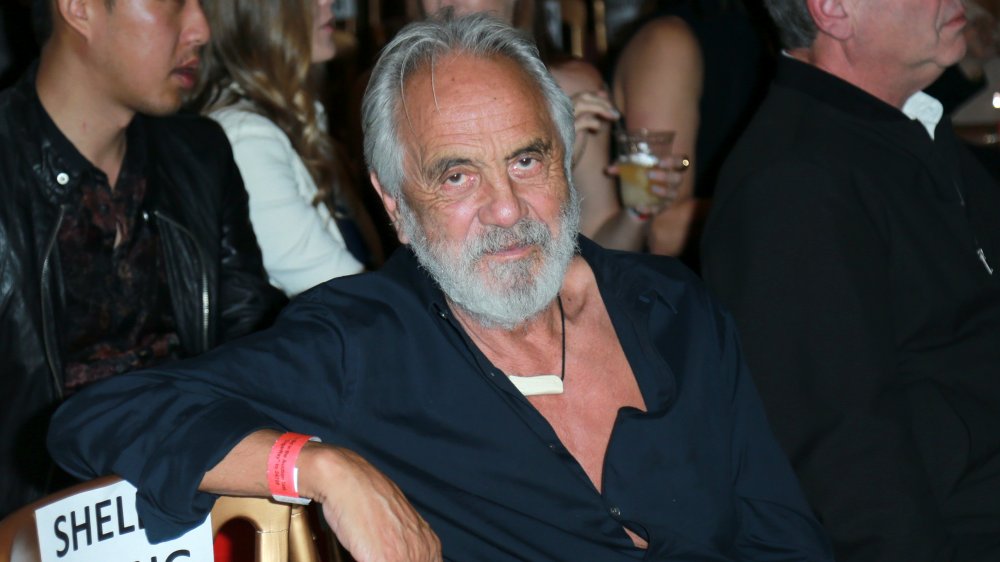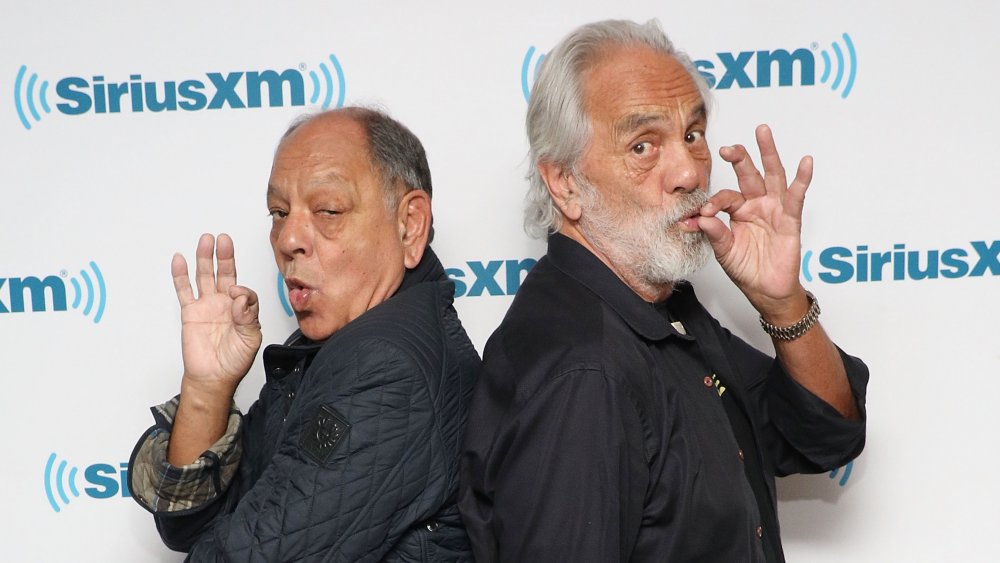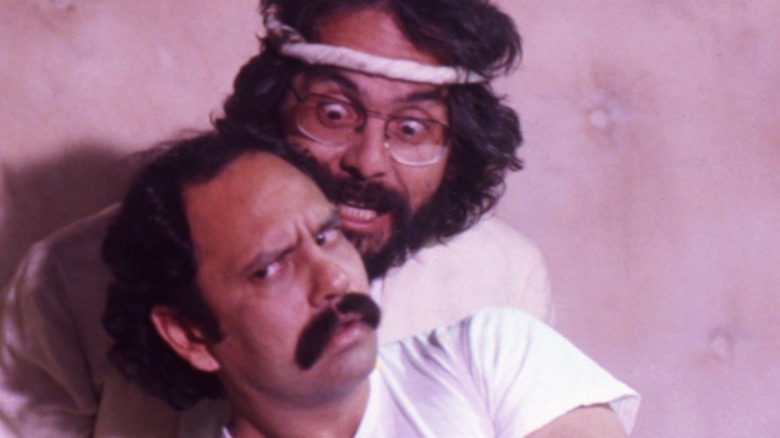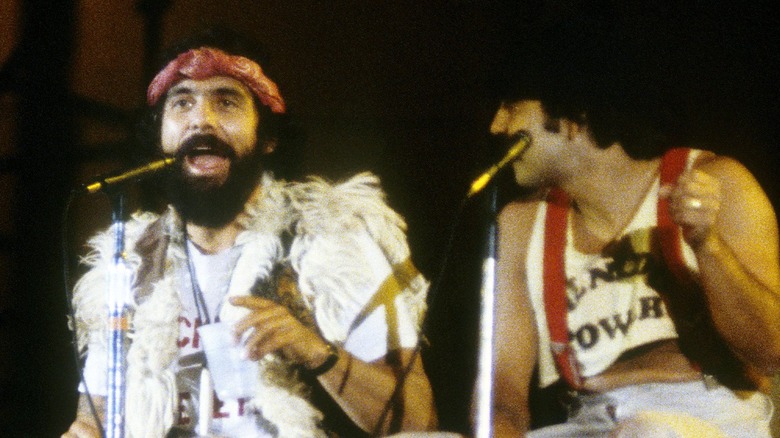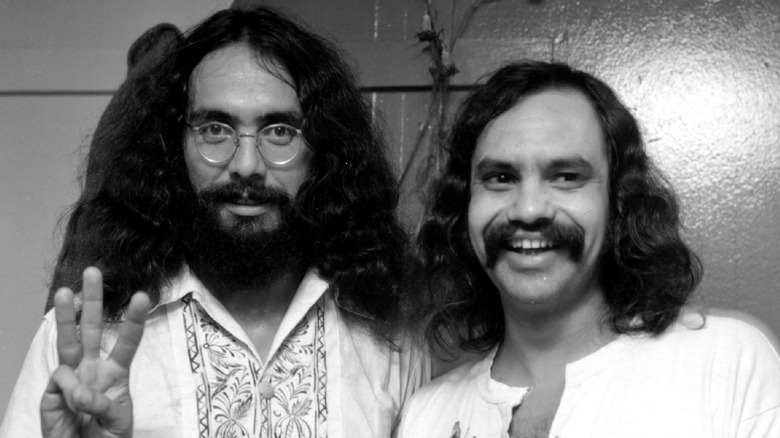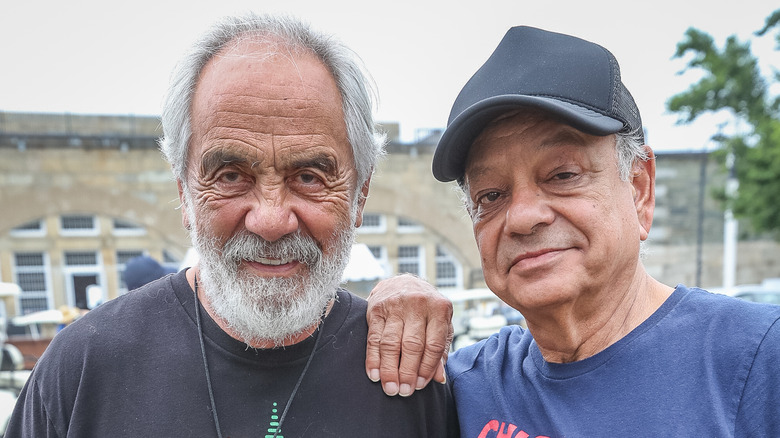The Untold Truth Of Cheech & Chong
Raunchy and irreverent, Richard "Cheech" Marin and Tommy Chong captured the spirit of early 1970s counterculture with an authenticity that only a handful of comedy acts could muster. Standing alongside such greats of the era as George Carlin and Richard Pryor, Cheech and Chong, with their over-the-top humor and deceptively lowbrow antics, lampooned the post-hippie era's abandonment of idealism for the simple escapism of sex, drugs, and rock 'n' roll. In their hilarious live performances, they tackled every hot-button topic imaginable, from race and politics to the Vietnam War, through their outrageous skits and characters.
In 1971, the comedy team released their first record. Introducing the world to such Cheech and Chong favorites as deejay Wink Dinkerson and the eternally stoned Pedro and Man, the self-titled album was a hit with both critics and fans. Thanks to Cheech and Chong, the tuned-in and turned-on got their first comedy catchphrase in "Dave's not here, man." The duo would follow their first record with a succession of best-selling, Grammy-nominated albums.
As the '70s drew to a close, Cheech and Chong took their act to the silver screen. Adapting some of their most popular sketches into a loose script centered on their Pedro and Man personas, 1978's Up in Smoke transformed Cheech and Chong into the stoner Bob Hope and Bing Crosby. More films would follow, but by the mid-'80s, clashing egos led to an acrimonious breakup that lasted nearly two decades. This is the untold truth of Cheech and Chong.
College man Cheech Marin escaped the draft
Richard Anthony "Cheech" Marin was born on July 13, 1946, in South Central Los Angeles. His father, Oscar Marin, was an officer with the LAPD. Marin's mother, Elsa, worked as a secretary. He received the nickname "Cheech" from an uncle who joked that baby Richard looked like a chicharrón — a fried pork rind.
As a child, Marin moved with his parents to the LA suburb of Granada Hills, where he attended a Catholic high school. Altar boy Cheech had musical aspirations and performed in bands with his friends. A straight-A student, Marin also had a reputation as a class clown, which frequently landed him in hot water. "I was a pain in the ass," Marin said in 2017 to Talks at Google. "...I was always getting into trouble. I wasn't a malicious kid. I just couldn't shut up!"
After high school, Marin attended California State University at Northridge. While in college, he tried marijuana for the first time. Upon taking his first puff, straightlaced Marin was transformed. Dismissing the propaganda adults had fed him about the drug, he mused, "What else have they been lying to me about?"
While in college, Marin became active in the anti-war and draft resistance movements. With draft resisters being imprisoned, Marin escaped to Canada with the help of his pottery teacher. Working as an apprentice to a famous potter, Marin settled down to rustic life in a secluded log cabin in the Canadian wilderness.
A pre-fame Tommy Chong was a successful musician
Born to parents Stanley Chong, a Chinese immigrant who worked as a truck driver, and Lorna Jean Chong, a Canadian waitress, Thomas B. Kin Chong grew up in Calgary, Alberta, Canada. The product of an interracial marriage, Chong learned hard lessons about racism at an early age. In a 2020 interview with The Guardian, the comedian opened up about his childhood in conservative Calgary. Recalling his exclusion from a friend's birthday party, Chong states, "I just looked out of the window of the second story and could see my friends gathering around the fire. I was uninvited 'cos the girl's father was worried she might end up with a [...] Chinese guy."
At 16, Chong dropped out of high school to pursue a career in music. A talented guitarist, he landed a gig with the Shades, a multiracial soul group out of Calgary. Changing their name to Little Daddy and the Bachelors, the band moved to Vancouver, where they released a single and built a small following. The band would reach its pinnacle, however, when it became Bobby Taylor & the Vancouvers. Recommended to Berry Gordy by Diana Ross and the Supremes, the band signed with Motown and recorded the top 40 hit "Does Your Mama Know About Me?" Co-written by Chong and Bobby Taylor, the touching ballad about an interracial couple peaked at #29 on the Billboard Hot 100 and made it to the top five on the R&B charts.
When Cheech met Chong
After being fired from his band, Tommy Chong pocketed a $5,000 severance check and made his way back to Vancouver. While on the road, his parents had converted one of the nightspots he owned into Vancouver's first topless club. Called the Shanghai Junk, the club would become the center of Chong's creative world.
Traveling with Bobby Taylor & the Vancouvers, Chong had been exposed to the comedy of Chicago's Second City. He found renewed purpose in improv, and the Shanghai Junk was the perfect venue to hone his comedic chops. Recruiting four topless dancers, a mime, and a classical guitarist, Tommy Chong was going to reinvent burlesque for the hippie generation.
Meanwhile, Richard Marin had migrated to Vancouver and found work as a part-time writer for Poppin, a local music magazine. Marin's editor suggested that he meet with "this guy who's running an improvisational theater troupe out of a topless bar in the worst part of Chinatown." The unconventional pair hit it off, and Marin was brought on as a writer.
According to Tommy Chong's book, Cheech and Chong: The Unauthorized Autobiography, the duo's famous act came about by accident when Chong and his new musical group were scheduled to play their first show. To warm up the crowd before the show, Tommy Chong and Richard Marin came out to tell some jokes. The audience was doubled over with laughter as one hilarious bit melted into another. The act went on so long that there was no time for the band to play.
Cheech and Chong become stoner comedy legends
As detailed by Tommy Chong, an energized Cheech and Chong headed for the comedy capital of the world, Los Angeles. The duo landed a gig at an open mic night at Redd Foxx's comedy club thanks to Chong's connections in entertainment. Nevertheless, the two struggled financially and were forced to move in with Chong's estranged wife, making for a living situation that quickly became untenable. Circumstances became especially dire when dwindling profits forced Chong's Vancouver nightclubs to close, leaving the struggling comic with no income. Slowly, Cheech and Chong began performing regular gigs at several Southern California clubs. After a disastrous show at the Irma Hotel, the two decided they just weren't connecting with their audience. Mining the peace, love, and dope ethos of the era for material, they developed and refined their Pedro and Man characters.
Audience response was immediate. The lovable stoners were comedy gold. The unwitting counterculture heroes' success led to sold-out shows, better venues, and a deal to make their first comedy record when music producer Lou Adler caught their act at LA's legendary Troubadour. With $2,000, a tape recorder, and a rehearsal space at A&M Records, Cheech and Chong crafted an eponymous comedy masterpiece that showcased their wit, razor-sharp timing, and brilliant voice characterizations. Released in August 1971, Cheech and Chong connected with critics and audiences alike, eventually peaking at #28 on the Billboard charts. The album also garnered the comedy team what would be the first of six Grammy nominations for Best Comedy Recording.
Cheech and Chong conquer Hollywood
In 1978, Cheech and Chong set their sights on conquering the film world with their first feature, Up in Smoke. Although they originally conceived the movie as a compilation of the best bits from their albums and live shows, Cheech and Chong instead decided to concentrate on their Pedro and Man characters. "It was a day in the life of [...] Pedro and Man, which was much more interesting than a plot," Marin tells Rolling Stone. "It's, 'Two guys meet, they decide to form a band together, but first they need a joint.' Therein lies your plot."
With no formal script, only what Tommy Chong describes as a loose "road map" written on a yellow legal pad, Up in Smoke was largely improvised. With Lou Adler at the helm, Cheech and Chong had free reign to experiment. Chong says of Adler, "If we changed our minds halfway through a shoot, and said, 'Oh, let's do this instead,' he'd say, 'OK, no problem.'"
Still, Up in Smoke faced its share of obstacles on its journey to the screen. As recounted by Variety, upon seeing a rough cut of the film, Paramount president Michael Eisner pulled the plug on the picture. Director/producer Lou Adler bought the film back from Paramount, using his own money to complete the movie. After witnessing a test audience's reaction, Eisner relented, and Paramount bought the film back. Budgeted at just under $2 million, Up in Smoke wound up making $20 million in its first month of release.
Cheech and Chong change direction
Cheech and Chong followed Up in Smoke with Cheech and Chong's Next Movie in 1980 and Nice Dreams in 1981. Sticking to their patented drug humor, the subsequent movies failed to live up to the high (pun intended) standard set by the first film but were still filled with classic Cheech and Chong moments and turned a tidy profit against their relatively low budgets.
The comedy duo's next film, Things are Tough All Over, released in 1982, featured Cheech and Chong temporarily putting down their giant spliffs for a more story-oriented comedy. The following year, Cheech and Chong returned with Still Smokin, a loose collection of sketches and concert footage that finds the stoners in Amsterdam for a film festival.
Critics were not kind, but the fans stood by the duo and their bawdy, juvenile humor. However, their next project, a radical departure from their tried-and-true formula, left even the most loyal Cheech and Chong devotees wondering what the pair were smoking. Cheech and Chong's The Corsican Brothers, released in 1984, cast the comedy legends in a spoof of Alexandre Dumas' classic story of brothers who can feel each other's physical pain. Reviews were typically dismissive, but this time, audiences took a pass as well. Failing to make back even half of its $10 million budget, The Corsican Brothers would be Cheech and Chong's final feature.
Cheech and Chong split up
In 1985, Cheech and Chong released the album and home video Get Out of My Room. It would be the duo's final release before their acrimonious split. After nearly two decades, ego and creative differences dating back to at least 1981's Nice Dreams had soured their friendship. Although Cheech and Chong had soldiered on through their differences, never allowing their animosity toward each other to affect their working relationship, tensions between the two became unbearable.
"There was always a contentious conversation between Tommy and I because we were very strong personalities [...] but it was the irritant that produced the pearl," Richard Marin related to Talks at Google. Nevertheless, Marin insists that the cause of the breakup came down to Tommy Chong's inflated ego. "As we went along and got more success, Tommy wanted to be everything," Marins says. "He wanted to be the director and the sole writer. [...] That tension kept building until he didn't want me to write anymore." Chong's refusal to participate in the recording of the song "Born in East L.A." was the final straw for Marin.
Decades later, a humbler Tommy Chong agrees with his partner's assessment of their breakup. "I was really, really hurt — although it was probably my fault," Chong told AllOutShow's Jude Angelini in 2017. "I got to be a bit of a megalomaniac when it came to the movies. [...] Once you become a director, your word's God, and it's hard to lose that."
Cheech without Chong
Cheech's "Born in East L.A.," a parody of Bruce Springsteen's "Born in the U.S.A.," was a huge hit despite Chong's absence. Based on the success of the song and its accompanying video, Universal executive Frank Price contacted Marin suggesting that the story of a hapless Mexican American man's misadventures after being mistakenly deported would make for a great comedy feature. Marin jumped at the opportunity, writing, directing, and starring in his first major project without Tommy Chong.
A modest hit, 1987's Born in East L.A. established Richard Marin as a creative force on his own. "[The movie] kicked off the rest of my life," Marin told CBS in 2017. With a knack for creating characters through accents and dialects, the newly liberated Cheech became an in-demand voice actor. He also got the rare opportunity to show off a subtler side of his comedic skills opposite Academy Award winner Kevin Costner in the 1996 romantic comedy Tin Cup.
By the late 1990s, Richard Marin had put the drug-addled comedy of Cheech and Chong behind him with a slew of roles in TV and movies. A new generation of fans would come to know Cheech Marin not as the perennially wasted Pedro of his Cheech and Chong days but as San Francisco special investigator Joe Dominguez on the CBS cop show Nash Bridges. He also became a familiar face in indie filmmaker Robert Rodriguez's action movies and kids' comedies.
Tommy Chong gets busted
While Cheech Marin set out on a career as a mainstream star, Tommy Chong returned to the stage as a solo stand-up act. Chong continued to rely on his reputation as the world's most famous stoner with the 1990 comedy Far Out Man. Keeping a relatively low profile throughout the 1990s, Chong returned to the public eye in a big way as aging hippie Leo on Fox's popular sitcom That '70s Show in 1999. Chong's comeback, however, was short-lived.
In 2003, Chong Glass/Nice Dreams, a company founded by Tommy Chong and his son Paris, was implicated in two investigations aimed at businesses selling drug paraphernalia. In an effort to keep his son and wife out of jail, Chong and his attorneys arranged for a plea deal which would find the comedian admitting to one count of conspiracy to distribute drug paraphernalia. Despite his best efforts, Tommy Chong was unable to negotiate for public service and house arrest and was sentenced to nine months in prison, as reported by the Pittsburgh Post-Gazette. Of the 55 individuals charged, Chong was the only defendant with no prior convictions to do jail time.
A family-friendly Cheech Marin
Perhaps the most ironic aspect of Cheech Marin's post-Cheech and Chong career is that the once decidedly adults-only comedian of the weed-fueled counterculture has become a fixture of children's entertainment. Marin began a long association with Walt Disney animation in 1988, when he voiced Tito the Chihuahua in Oliver and Company. He would go on to voice Banzai, the hyena, in the animated blockbuster The Lion King and Ramone the lowrider in the Cars franchise.
In 1992, Marin released his first album of children's music. Titled My Name is Cheech, the School Bus Driver, the record casts Cheech as a friendly bus driver who teaches his young passengers about everything from math to making friends. Cheech the school bus driver returned in 1997 with an all new musical adventure for kids titled My Name is Cheech, the School Bus Driver: Coast to Coast. The comic has since chronicled the further adventures of his kid-friendly alter ego in a series of children's books published by HarperCollins.
Beginning in 2001, a recurring part as agent Felix Gumm in Robert Rodriguez's Spy Kids action-comedies further endeared the former stoner icon to a younger audience.
Tommy Chong versus cancer
In a 2012 interview with CNN's Don Lemon, Tommy Chong publicly announced that he had been diagnosed with prostate cancer. A longtime advocate for marijuana legalization and the medical use of cannabis, Chong turned to the plant as part of his treatment. "I've got prostate cancer, and I'm treating it with hemp oil, with cannabis," he said. "So [legalizing marijuana] means a lot more to me than just being able to smoke a joint without being arrested."
Less than a year later, Chong announced in a post to CelebStoner.com that with a combination of hash oil and dietary supplements, he had "kicked cancer's ass." Unfortunately, Chong would face another health setback in 2015, when he announced that, although his prostate cancer was in remission, he was under treatment for rectal cancer. In typical Chong style, he took the news with optimism and humor. Joking that the diagnosis was a "pain in the butt," Chong told Us Weekly, "I'm using cannabis like crazy now, more so than ever before. I'm in treatment now [...] either I get healed or I don't. But either way, I'm going to make sure I get a little edge off or put up."
Cheech and Chong together again
A Cheech and Chong reunion has been in the works since 2003, with the iconic comedy duo planning a new movie. Chong's incarceration for marketing and promoting drug paraphernalia, unfortunately, derailed their big screen plans. To the delight of their legions of fans, Cheech and Chong finally re-teamed for a 2008 nationwide comedy tour.
On stage together for the first time in 25 years, Cheech and Chong found that the old magic remained, and their chemistry was as vital as ever. "When we came back last year to start doing this, we didn't really even rehearse," Cheech Marin told NPR. "We just kind of talked over what we were going to do and then went on stage and did it. It was like we've been apart 25 seconds, not 25 years."
Over a decade into their reunion, the pair continue to pack theaters for their sold-out live shows. Cheech and Chong, now into their seventies and eighties, respectively, are still smokin' in the 21st century.
There's an unmade Cheech and Chong horror movie
From the late 1970s through to the mid-1980s, Cheech Marin and Tommy Chong made seven live-action comedies together, mostly comprised of loosely connected sketches and pioneering the cult favorite subgenre known as the "stoner comedy." That total doesn't include the 1985 not-quite-feature-length self-aware Cheech and Chong mockumentary "Get Out of My Room," or 2013's "Cheech and Chong's Animated Movie," but the pair nearly starred in one more lark — a horror movie, and crossover with another well-known franchise.
Filmmaker Tom McLoughlin wrote and directed a single entry in the Jason Voorhees saga, "Friday the 13th Part VI: Jason Lives," but he approached series producer Frank Mancuso Jr. with an idea for another movie. After mutually deciding to bail on a Jason vs. Freddy Krueger movie (one which would actually get made in 2003) over rights issues, McLoughlin suggested a property that home studio Paramount controlled. "You guys own Cheech and Chong. What if we do Cheech and Chong-meets-Jason?'" McLoughlin recalled on the "Post Mortem" podcast (via Entertainment Weekly). "They're like camp counselors or something. It's like, 'Hey man, I saw Jason out there.' 'No, man, that's a myth.'" Mancuso rejected the idea immediately.
Dave's here, man
"Dave" is probably the single-most famous, beloved, and enduring bit from the entire Cheech and Chong multimedia canon, and according to the Los Angeles Times, it was also the first thing the duo ever officially recorded together, a minute-and-a-half-long sketch about a man named Dave so stoned that when a friend knocks on his door looking for him (to bring him more marijuana), he is greatly confused and announces "Dave's not here," even though he is Dave.
That ridiculous and broad sketch is based on true events. During a writing session at an A&M Records studio in the early '70s, Marin left for a while, and when he returned (with marijuana) the studio door was locked. "So he knocked on the door, and I was supposed to let him in, but I wanted to make sure the recording was working," Chong said. "The second time he knocked, I saw that the needle was moving, so I started the bit." Marin didn't know he was being recorded. "It's me, man. Open up. I got the stuff," he said, to which Chong played along, pretending to be innocent and unaware. "I could hear the anxiety," he said. "The last time I told him I wasn't there, he blew it. He went nuts."
Cheech and Chong were only work friends
Steadfast partners on numerous records and in a bunch of movies, Richard "Cheech" Marin and Tommy Chong are forever linked. Their relationship was forged over shared bonds and interests in work and marijuana; according to the Los Angeles Times, they met in the late '60s in Vancouver and hung out at Chong's improv theater where they smoked and wrote comedy routines.
While that's a cordial and friendly arrangement, it wasn't quite ever a true friendship. "We were never friends. We got along but we were never pals," Chong told the Bucks County Courier Times in 2018. "We had a professional partnership that went really well and then we had to do other things," he said, referring to their amicable split in 1986. "It was the wisest thing that we didn't stay together like comedy teams like Abbott and Costello, who ended up hating each other, or Martin and Lewis, who were jealous of each other." Chong said he and Marin did a lot of solo work that the other "always appreciated."
Cheech and Chong didn't get high on the job
Cheech and Chong were the public faces of pot consumption for multiple generations, their records and films popularizing drug humor as well as the "stoner" persona. While touring their act in the 1970s, the pair did indeed use a fair amount of the plant they so thoroughly celebrated. "For the most part we were always high," Chong told The Guardian. "We always smoked a little before we went out there. That was part of the job." He added that he felt drugs made his writing better, not just marijuana but cocaine and LSD, too.
When it came time to make those movies written under the influence, smoking pot was a different story. The voluminous amount of marijuana smoked on screen in the 1978 Cheech and Chong movie "Up in Smoke" was primarily tobacco and Indian herbs. According to Marin, using actual marijuana would've made the movie impossible to shoot. "We maybe smoked after shooting, but not when we're working. We had to sustain a level of energy," he told Rolling Stone. "We had long days on set. If we got stoned, we wouldn't get it done."
